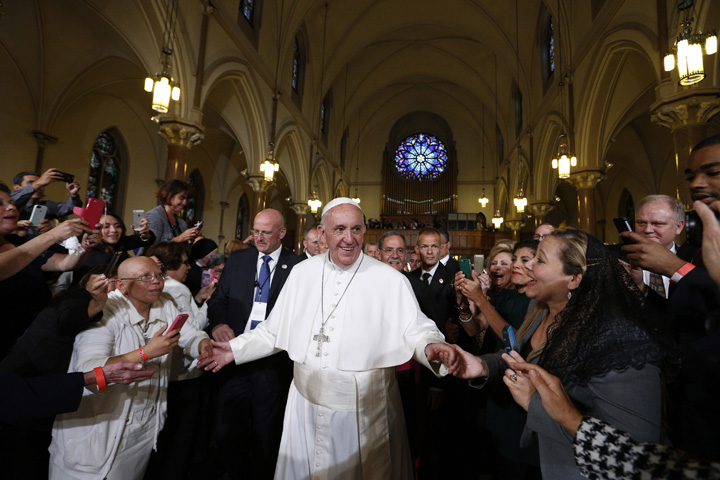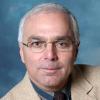
Pope Francis arrives to give a talk at St. Patrick in the City Church in Washington Sept. 24. (CNS photo/Paul Haring)
From celebrating Masses at Havana's Revolution Square in Cuba, Washington, D.C., New York City and Philadelphia, to addressing the U.S. Congress and the United Nations -- and with lots packed in between -- 78-year-old Pope Francis tirelessly proclaimed the Gospel precepts of human dignity, forgiveness, social justice, peace, the common good, care for the poor and vulnerable, protection of the earth and love for all.
As the first pope in history to address a joint session of Congress, Pope Francis, defending the human right of masses of oppressed and poor people to immigrate, said, "We must not be taken aback by their numbers, but rather view them as persons, seeing their faces and listening to their stories, trying to respond as best we can to their situation.
"We need to avoid a common temptation nowadays: to discard whatever proves troublesome. Let us remember the Golden Rule: 'Do unto others as you would have them do unto you' (Mt 7:12)."
Francis explained, "In a word, if we want security, let us give security; if we want life, let us give life; it want opportunities, let us provide opportunities."
Promoting the Catholic church's consistent ethic of life doctrine, which calls for the full protection of the life and dignity of every person from conception to natural death, the Holy Father said, "The Golden Rule also reminds us of our responsibility to protect and defend human life at every stage of its development.
"This conviction has led me, from the beginning of my ministry, to advocate at different levels for the global abolition of the death penalty."
Next, Francis tried to awaken a greater concern for the poor. "I would encourage you to keep in mind all those people around us who are trapped in a cycle of poverty. They too must be given hope. The fight against poverty and hunger must be fought constantly and on many fronts, especially in its causes."
Referring to his recent encyclical letter on the environment and humanity's integral link to it, Francis said, "In Laudato Si' ["Praise be to you"], I call for a courageous and responsible effort … to avert the most serious effects of the environmental deterioration caused by human activity."
With the U.S. leading the world in the sale of weapons, Francis asked its leaders, and the rest of us: "Why are deadly weapons being sold to those who plan to inflict untold suffering on individuals and society"? Sadly, the answer is "simply for money: money that is drenched in blood, often innocent blood. In the face of this shameful and culpable silence, it is our duty to confront the problem and to stop the arms trade."
Next stop, the United Nations.
On the following day, Francis, speaking before the U.N. General Assembly, said
"Government leaders must do everything possible to ensure that all can have the minimum spiritual and material means needed to live in dignity and to create and support a family, which is the primary cell of any social development.
"In practical terms, this absolute minimum has three names: lodging, labor, and land; and one spiritual name: spiritual freedom, which includes religious freedom, the right to education and other civil rights."
Francis further explained, "These pillars of integral human development have a common foundation, which is the right to life."
He said "war is the negation of all rights and a dramatic assault on the environment. If we want true human development for all, we must work tirelessly to avoid war;" in part this means strongly opposing "the constant tendency to the proliferation of arms, especially weapons of mass destruction, such as nuclear weapons."
Defending those who have been pushed to the fringe of societies, Francis said our common home must be built on a foundation of "respect for the sacredness of every human life, of every man and every woman, the poor, the elderly, children, the infirm, the unborn, the unemployed, the abandoned, those considered disposable. … This common house of all men and women must also be built on the understanding of a certain sacredness of created nature."
Quoting from Blessed Pope Paul VI's still timely address to the U.N. 50 years ago, Francis said, "The appeal to the moral conscience of man has never been as necessary as it is today. … The edifice of modern civilization has to be built on spiritual principles, for they are the only ones capable not only of supporting it, but of shedding light on it."
In a meeting with homeless men and women at St. Patrick Catholic Parish in Washington, D.C., Francis, speaking truth to those with no worldly power, said, "We can find no social or moral justification, no justification whatsoever, for lack of housing. There are many unjust situations, but we know that God is suffering with us, experiencing them at our side. He does not abandon us."
In the face of so much injustice, injustice Pope Francis is calling us to correct, it is reassuring to know that the God of justice, peace and love is at our side, and will never abandon us.
[Tony Magliano is an internationally syndicated social justice and peace columnist. He is available to speak at diocesan or parish gatherings about Catholic social teaching. His keynote address, "Advancing the Kingdom of God in the 21st Century," has been well received by diocesan gatherings from San Clemente, Calif., to Baltimore. His email address is tmag@zoominternet.net.]
Editor's note: We can send you an email alert every time Tony Magliano's column, "Making a Difference," is posted. Go to this page and follow directions: Email alert sign-up.
